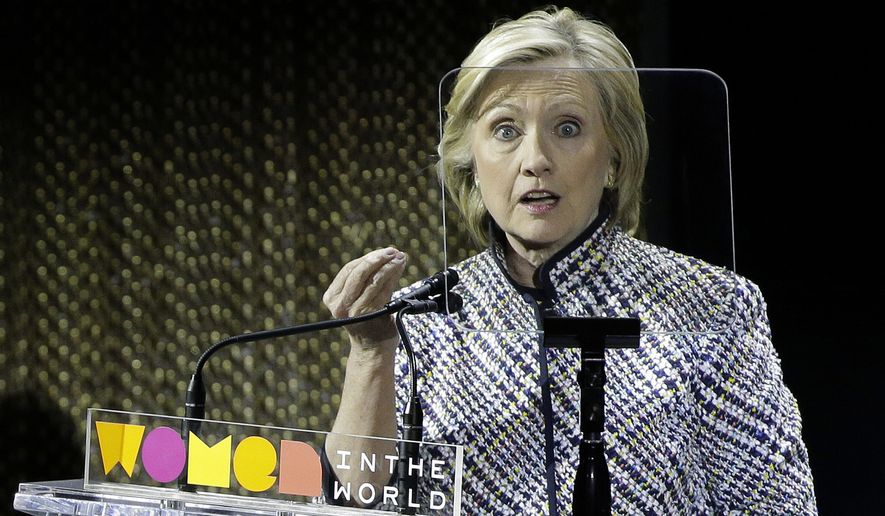The White House struggled Thursday to fend off a barrage of questions about foreign donations to the Clinton Foundation during the tenure of former Secretary of State Hillary Rodham Clinton, including reports of donations linked to a deal that helped Russia nearly corner the world uranium market with State Department approval.
Mrs. Clinton’s presidential campaign has wrestled with the same questions, but neither the campaign nor the White House provided enough answers to quell the uproar.
Scrutiny of foreign money swirling around Mrs. Clinton, including skyrocketing speaking fees paid to her husband, former President Bill Clinton, and megadonations to their charitable foundation after she became America’s top diplomat, will only intensify and dog her on the campaign trail.
White House press secretary Josh Earnest insisted that President Obama is not troubled by reports that the Clinton Foundation accepted $2.35 million from a businessman involved in Russia’s uranium deals that required approval from the U.S. State Department as well as other countries.
“At this point, there has not been any evidence presented that would prompt the president or anybody at the White House to be unsettled by Secretary Clinton’s conduct as secretary of state,” said Mr. Earnest. “In fact, everyone here at the White House, including the president, continues to be very proud of her service to this country.”
The contributions were not publicly disclosed by the Clintons, despite a memorandum of understanding between Mrs. Clinton and the Obama administration that required donations to the foundation to be disclosed to avoid any appearance of a conflict of interest, The New York Times reported.
SEE ALSO: Mitt Romney on Clinton Foundation uranium story: ‘It looks like bribery’
The deal gave Russia’s atomic energy agency, Rosatom, control of uranium mines stretching from Asia to the Western U.S., including half of America’s uranium supply.
Shortly after the Russians announced plans to buy mining giant Uranium One, a Russian investment bank with ties to the Kremlin and the deal paid Mr. Clinton $500,000 for a speech in Moscow, according to the newspaper.
That was about five times Mr. Clinton’s typical speaking fee.
Mr. Earnest said he wasn’t familiar with details of the Russian case.
Asked whether the administration is concerned that examples continue to emerge about questionable donations from foreign governments or foreign entities to the Clinton Foundation, he said no.
“The president and the administration continue to have a strong confidence in the decision-making of Secretary Clinton,” he said.
Still, Mr. Earnest declined to answer a reporter’s question on whether it is now “clear” that Mrs. Clinton didn’t abide by an agreement she signed with the administration before becoming secretary of state in 2009 to disclose donations to the foundation and the speaking fees paid to her husband.
“I’m not sure that that’s clear, but you should go ask Secretary Clinton’s team about that,” Mr. Earnest said.
The Clinton campaign did not respond to questions about violating the memorandum of understanding.
Mrs. Clinton, who is the odds-on favorite to win the Democratic presidential nomination, also came under fire form her potential Republican rivals.
“It’s the Clinton way: raking in millions from foreign governments behind closed doors while making promises about transparency that they never intended to keep. Now they’re scrambling to refile their taxes and account for her decisions as Secretary of State,” Carly Fiorina, the former chief executive of Hewlett-Packard who plans to announce her Republican presidential run May 4, wrote on her Facebook page.
She continued: “The American people will have a choice. Are we going to demand trust and transparency from our leaders? Have we had enough of a ruling political class that doles out favors to the wealthy and well connected few?”
The Clinton campaign has tried to tamp down the controversy since it emerged this week in previews of the book “Clinton Cash: The Untold Story of How and Why Foreign Governments and Businesses Helped Make Bill and Hillary Rich.”
The book, by conservative political adviser Peter Schweizer, argues that the Clintons got rich from speaking fees and donations in return for favors from Mrs. Clinton to various foreign interests while running the State Department.
Other dealings include a free trade agreement in Colombia that benefited a major foundation donor’s investments in the South American nation, development projects in Haiti after a devastating earthquake in 2010, and more than $1 million in payments to Mr. Clinton by a Canadian bank and major shareholder in the Keystone XL oil pipeline that occurred while the project was under State Department review, according to reports.
The Clinton campaign tried to dismiss the accusations as a right-wing “smear project,” but that becomes increasingly difficult as mainstream news outlets pick up the story.
Clinton campaign spokesman Brian Fallon sent a memo Thursday to supporters and donors in an attempt to beat back the accusations.
“The bottom line remains that the book fails to produce a shred of evidence supporting the theory that Hillary Clinton ever took action as Secretary of State for the purposes of supporting the interests of donors to the Clinton foundation,” he wrote.
At a campaign stop in New Hampshire this week, Mrs. Clinton brushed aside reporters’ questions about connections between contributions from foreign entities and her actions as secretary of state, calling them merely “distractions and attacks.”
“I know that that comes, unfortunately, with the territory,” she told The Associated Press.
• Dave Boyer can be reached at dboyer@washingtontimes.com.
• S.A. Miller can be reached at smiller@washingtontimes.com.




Please read our comment policy before commenting.